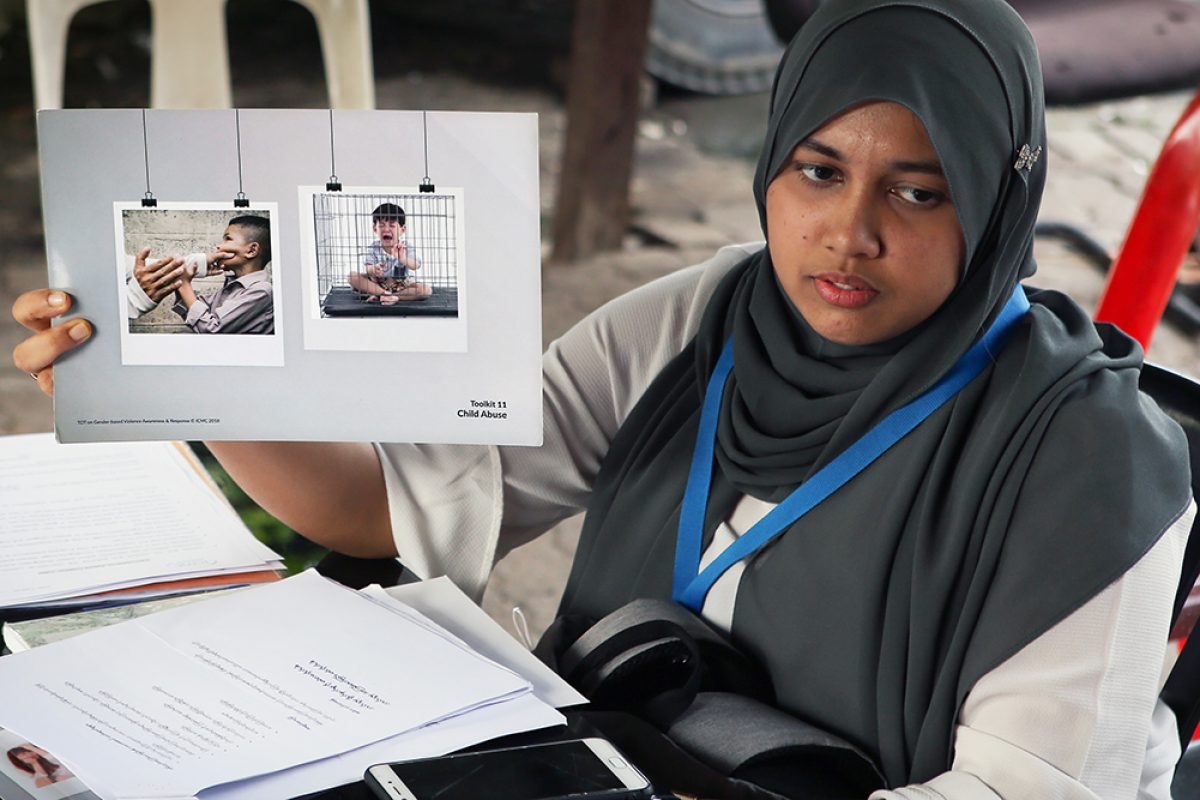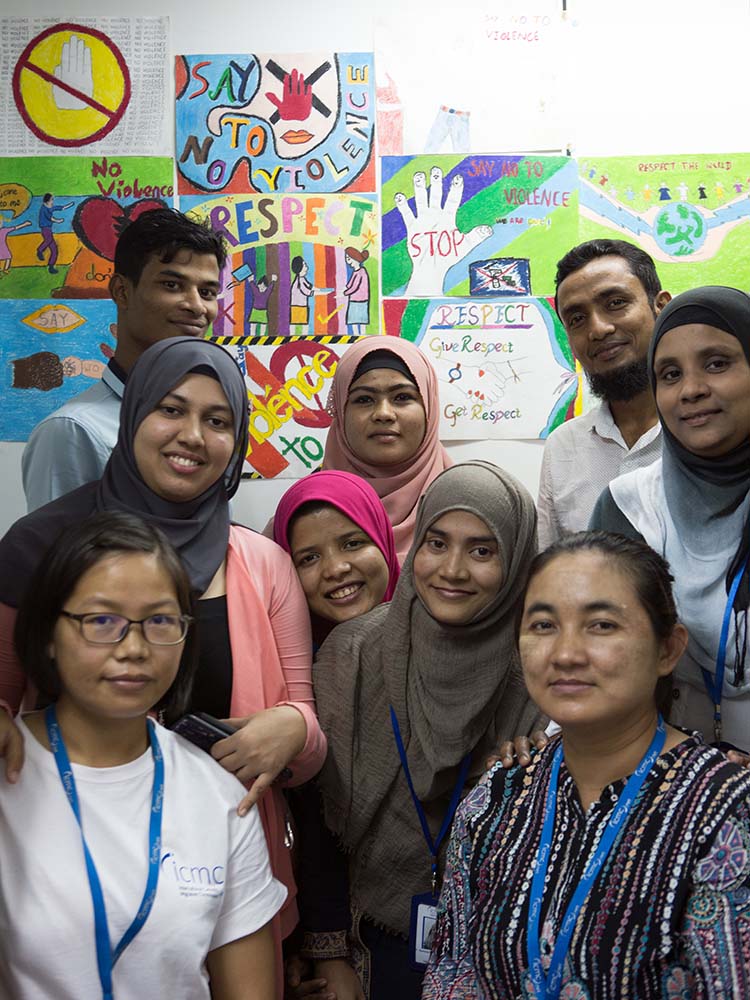Meeting Survivors of Gender-Based Violence Where They Are

By Corinne Brodeur*
Urban refugees are often socially isolated from their host communities. To reach those who need it and build trust, the ICMC’s Refugee Protection Corps, made up of refugees from different communities in Malaysia, use their personal contacts. They conduct outreach activities, identify gender-based violence survivors, and accompany them as they are empowered to rebuild their lives.
It is 11 am when Mumtaz** and Laila** arrive at their appointment on the outskirts of Malaysia’s capital, Kuala Lumpur. The home they have come to visit is a one-room wooden house, an informal settlement hidden from the street by the row of official houses. It stands on the edge of a steep slope overgrown by jungle remnants.
A family of Rohingya refugees lives here: a mother, her two adult sons and their wives, and her four grandchildren. The matron and her daughters-in-law invite the visitors to take a seat on the porch.
Mumtaz and Laila are members of International Catholic Migration Commission’s Refugee Protection Corps, an essential part of ICMC’s work on sexual and gender-based violence in Malaysia. They are Rohingya refugees who have fled persecution in Myanmar, and the Rohingya refugee community is their own. Their ties to and knowledge of the language and culture allow them to approach community members, gain their trust, and be positive role models in a way that outsiders could not.
Today, Mumtaz and Laila are here to present a two-hour awareness-raising session on sexual and gender-based violence. With visual aids, they take turns defining gender stereotypes, domestic violence, child abuse, child marriage, sexual harassment, and rape. They discuss the negative consequences that these actions can have on girls, women, families, and the community, and they explain how to address each of them.
“Everything that you said, all of it is my story,” says the older woman as they approach the end of the training. “My parents sent me to Malaysia to marry when I was fifteen and my husband beat me every day.”
The woman tells Laila and Mumtaz about the physical abuse by her husbad that she has endured for decades. She also explains how, on many occasions, he disappeared for months at a time, leaving her and her children without money for food or medication.

On one of the occasions, her husband married another woman while he was away. “It’s all my story but I didn’t know it was abuse, and I didn’t know where I could find help,” the woman says.
Back in Myanmar, most Rohingyas live in rural areas of some of the country’s poorest districts. Decades of persecution by the government have left them without access to education, healthcare, and employment opportunities.
The community adheres to strict gender norms and practices gender segregation in many aspects of public life. While men work outside the home, women are responsible for caring for the children and the elderly, preparing food and cleaning. They rarely leave their homes without their husband’s permission. Women’s employment is frowned upon, and women and girls often view marriage as their only option for economic security. Arranged marriages are the norm.
Intimate partner violence and child marriage are normalized in the Rohingya community and considered legitimate by both women and men. In a context of forced displacement because of persecution, things tend to get much worse. The strain of economic pressures, frustration at the lack of economic opportunities and perspectives for the future, absence of a working legal framework, and trauma —all exacerbate the potential for gender-based violence.
Malaysia does not officially recognize refugees. They live in a legal grey zone of sorts. They are tolerated by the State, yet always fearing deportation or detention, or forced to pay bribes to local police to retain their freedom. Like many other women who suffered violence in silence, she has mixed feelings about making an official deposition. She worries that reporting her husband may lead to a separation of her family. Mumtaz and Laila leave her a hotline number which she can get in touch with ICMC should she needs help in the future. The woman feels supported having the number, knowing that she can contact ICMC.
ICMC’s survivor-centered approach means that the needs and wishes of survivors are put at the forefront of protection and counseling activities. This empowers survivors, allowing them to choose which course of action is most suitable for them given their situation and needs.
Now that today’s host has been identified as a survivor, the Refugee Protection Corps will stay in touch with her, informing her of her possibilities and supporting her when she decides to seek assistance.
Thanks to their activities, the 12 women and men who make up the Rohingya Refugee Protection Corps create awareness of the harms of gender-based violence and child abuse, the first step towards identifying and assisting survivors. They are also models for change in their community, proving that women’s employment and men’s support to the empowerment of women and girls are compatible with traditional Rohingya values.
ICMC’s Refugee Protection Corps performs a wide array of activities that include awareness-raising, interpretation for counselors and caseworkers, and peer-to-peer counseling sessions with survivors. The Refugee Protection Corps is essential to ICMC Malaysia’s operations with Rohingya, Burmese, and Arabic-speaking refugees. Door-to-door awareness-raising activities are supported by the US Department of State’s Bureau of Population, Refugees and Migration.
In the next part of this three-part series on ICMC Malaysia’s protection and prevention of sexual and gender-based violence, learn how the Refugee Protection Corps, ICMC, and its partners accompany survivors in urgent need of shelter and counseling.
*Corinne Brodeur is ICMC’s Communications Officer
**Names have been changed to protect refugees’ identity.
- Read “Providing Support to Rebuild Lives: ICMC’s Shelter and Counseling Services in Malaysia,” part two of this series on ICMC’s protection work for survivors of gender-based violence in Malaysia.